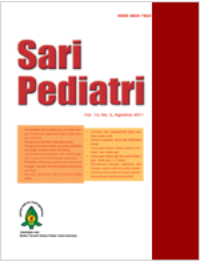Hipertensi pada Sindrom Metabolik
Sari
Obesitas merupakan masalah yang banyak dijumpai baik di negara maju maupun di negara berkembang.
Seiring dengan meningkatnya kejadian obesitas, dikenal sindrom metabolik yang terdiri dari obesitas
sentral, resistensi insulin, hipertensi, dan dislipidemia berupa kadar trigliserida yang tinggi dan kolesterol
high density lipoprotein (HDL) yang rendah. Sindrom metabolik terutama disebabkan oleh obesitas dan
resistensi insulin. Selain sebagai tempat penyimpanan energi, jaringan lemak juga menghasilkan faktor yang
menyebabkan hipertensi. Jaringan lemak dapat menguraikan angiotensin dari sistem angiotensin-renin.
Pada obesitas, terjadi resistensi insulin dan gangguan fungsi endotel pembuluh darah yang menyebabkan
vasokonstriksi dan reabsorbsi natrium di ginjal dan menyebabkan hipertensi. Penurunan berat badan
merupakan faktor penting dalam tata laksana sindrom metabolik dengan hipertensi yang dicapai dengan
diet, latihan, medikamentosa atau gabungan hal-hal tersebut. Obat antihipertensi dapat dipertimbangkan
sebagai bagian pendekatan holistik dalam tata laksana. (
Kata Kunci
Teks Lengkap:
PDFReferensi
Yoshinaga M, Tanaka S, Shimago A, Sameshima K,
Nishi J, Nomura Y, dkk. Metabolic syndrome in
overweight and obese Japanese children. Obesity
Research 2005;13:1135-40.
Cruz ML, Goran MI. The metabolic syndrome in
children and adolescents. Current Diabetes Report
;4:53-62.
Sun SS, Grave DG, Siervogel MR, Pickoff AA, Arslanian
SS. Systolic blood pressure in childhood predicts
hypertension and metabolic syndrome later in life.
Pediatrics 2007;119:237-46.
Dornfeld LP, Maxwell MH, Wals A, Tuck M. Mechanisms
of hypertension in obesity. Kidney Int 1987;22:254-8.
Robinson RF, Batisky DL, Hayes JR, Nahata MC, Mahan
JD. Body mass index in primary and secondary pediatric
hypertension. Pediatr Nephrol 2004;9:1379-84.
Weiss R, Dziura J, Burgert TS, Tamborlane WV. Obesity
and metabolic syndrome in children and adolescents. N
Engl J Med 2004;350:2362-74.
Soedibyo S, Firmansyah A, Djer MM. Prevalence and
influencing factors of obesity in elementary school pupils.
Pediatr Indones 1998;38:193-204.
Aneja A, El-Atat F, McFarlane IS, Sowers RJ.
Hypertension and obesity. Diunduh dari http://rphr.
endojournal.org. Diakses tanggal 09 April 2007.
National High Blood Pressure Education Program
Working Group on High Blood Pressure in Children
and Adolescents. The fourth report on the diagnosis,
evaluation, and treatment of high blood pressure in
children and adolescents (2004). Pediatrics 2004;114:555-
Umboh A, Kasie J, Edwin J. Hubungan antara resistensi
insulin dan tekanan darah pada anak obese. Sari Pediatri
;8:289-93.
Yogiantoro M. Hypertension and insulin resistance.
Dalam: Makalah lengkap The 6th Jakarta nephrology &
hypertension course and symposium on hypertension.
Pernefri;2006.h.103-115.
Nakagawa T, Tuttle KR, Short RA, Johnson RJ.
Hypothesis: fructose-induced hyperuricemia as a causal
mechanism for the epidemic of the metabolic syndrome.
Nature Clin Pract Nephrol 2005;1:80-6.
Sinaiko AR, Steinberger J, Moran A, Prineas RJ, Vessby
B, Basu dkk. Relation of body mass index and insulin
resistance to cardiovascular risk factors, inflammatory
factors, and oxidative stress during adolescence.
Circulation 2005;111:1985-91.
Manunta P, Bianchi G. Low-salt diet and diuretic effect
on blood pressure and organ damage. J Am Soc Nephrol
;15:43-6.
Krikken JA, Lely AT, Bakker SJL, Navis G. The effect
of a shift in sodium intake on renal hemodynamics is
determined by body mass index in healthy young men.
Kidney Int 2007;71:260-5.
Alderman MH. Dietary sodium and cardiovascular
health in hypertensive patients: the case against
universal sodium restriction. J Am Soc Nephrol
;15:47-50.
Reade EP, Whaley C, Lin JJ, McKenney DW, Lee D,
Perkin R. Hypopnea in pediatric patients with obesity
hypertension. Pediatr Nephrol 2004;19:1014-20.
Croix B, Feig DI. Chilhood hypertension is not a silent
disease. Pediatr Nephrol 2006;21:527-32.
Barker DJP, Bagby SP, Hanson MA. Mechanisms of
disease: in utero programming in the pathogenesis of
hypertension. Nature Clin Pract Nephrol 2006;2:700-7.
Wilkin TJ, Metcalf BS, Murphy MJ, Kirkby J, Jeffery
AN, Voss LD. The relative contributions of birth
weight, weight change, and current weight to insulin
resistance in contemporary 5-year-olds. Diabetes
;51:3468-72.
Brenner BM, Chertow GM. Congental oligonephropathy
and the etiology of adult hypertension and progressive
renal injury. Am J Kidney Dis 1994;71:260-65.
Mallare JT, Karabell AH, Mieyer PV, Stender SRS,
Christensen ML. Current and future treatment of
metabolic syndrome and type 2 diabetes in children and
adolescents. Diabetes Spectrum 2005;18:220-8.
Siverstein DM, Champoux E, Aviles DH, Vehaskari
VM. Treatment of primary and secondary hypertension
in children. Pediatr Nephrol 2006;21:820-7.
Matthews KA, Salomon K. Hostility predicts metabolic
syndrome risk factors in children and adolescents. Health
Psy 2003;3:279-86.
DOI: http://dx.doi.org/10.14238/sp11.4.2009.257-63
Refbacks
- Saat ini tidak ada refbacks.
##submission.copyrightStatement##
##submission.license.cc.by-nc-sa4.footer##
Email: editorial [at] saripediatri.org


Sari Pediatri diterbitkan oleh Badan Penerbit Ikatan Dokter Anak Indonesia
Ciptaan disebarluaskan di bawah Lisensi Creative Commons Atribusi-NonKomersial-BerbagiSerupa 4.0 Internasional.




